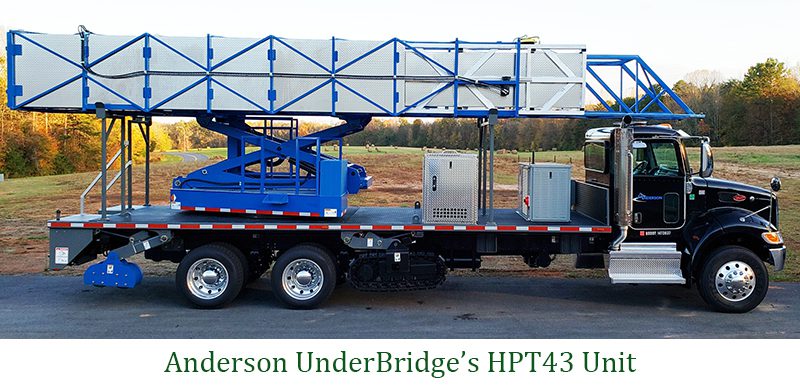MSEM Student Brings Capstone Project’s Efficiency, Savings to His Job

As an engineering professional, David Scherpf wanted to gain more project management skills in order to advance his career to the next level. He found UNC Charlotte’s Master of Science in Engineering Management (MSEM) program to be a perfect solution. Through the distance education program, he could continue to work full time, tailor instruction to his interest areas, and complete a real-world capstone project that met course requirements and, at the same time, led to improved efficiency and cost savings for his company.
Scherpf is a 2010 graduate of the University of Maryland, where he earned his Bachelor of Science in Mechanical Engineering. He is now a Sustaining Engineer for Anderson UnderBridge in York, South Carolina, a company that builds truck units that deploy scaffolding for bridge inspection and repair. He started the W.S. Lee College of Engineering Master of Engineering Management program in 2018 and will graduate in May 2021.
“I decided to do the masters,” Scherpf said, “because through my work experience I saw a lot of companies were looking for engineering management skills. So, going back to school made a lot of sense for my career. I knew UNC Charlotte had a good reputation in Engineering Management and the program personally appealed to me, because it offers a wide range of paths you can take. Its flexibility lets you select the classes in which you’re interested”

This flexibility also extends to capstone projects, where students work with their professors to develop projects that interest them and have real-world application value. Scherpf completed his capstone project in December 2020.
“For my capstone project, I wanted to do something that involved Lean Six Sigma and would help me apply the method to a project I was involved in at work,” Scherpf said. “Dr. (Tao) Hong (the graduate program director and Scherpf’s capstone advisor) helped me develop the scope for a project relating to the redesign of the power unit on our second biggest truck, the HPT43.”
The vendor of the power unit had discontinued the engine that runs the equipment at the back of the truck, so Scherpf had to spec and identify a new engine system and develop the assembly methods for building it into the truck.
“Using Lean Six Sigma in the decision-making process, I talked with a lot of customers about what they both needed and didn’t need from the unit,” Scherpf said. “This allowed me to tailor the unit to fit their specs. This actually led to eliminating some existing features they didn’t use or need, which allowed us to use a smaller engine and saved money overall.”
Link to Scherpf’s capstone project abstract
Scherpf worked with suppliers to resize the hydraulics, generator and engine, which saved $7,000 per unit. He then designed a new manufacturing process for the assembly of the units that was 50 percent more efficient than the old build method. He managed the building of a prototype, then performed tests to evaluate benefits.
“I have to give credit to Dr. Hong for making this project possible,” Scherpf said. “He helped me incorporate the elements of the Engineering Management program into this specific project. I got to work with the elements I was most interested in and put them to good use for Anderson UnderBridge.”
The project was a great example of how practical capstone projects fit into the MSEM program, Dr. Hong said. “The elements of the project, such as costs of labor and equipment, manufacturing processes, customer needs and decision analysis, were an excellent fit for what we offer in the curriculum,” he said. “David did a great job pulling it all together. It was gratifying to see the positive results for his company.”
Overall, the Master of Science in Engineering Management program has been a very positive experience, Scherpf said. “The most consistent thing I benefitted from throughout the whole program was the team projects,” he said. “We had to work with a new team on a new project every semester. This makes you learn people skills and how to be a good teammate. Doing it in a distance learning environment made it even more beneficial for me and the work I do at Anderson. I learned how to be upfront with communications from the very beginning of a project, as well as how to continue with good project management to make sure projects run smoothly.”